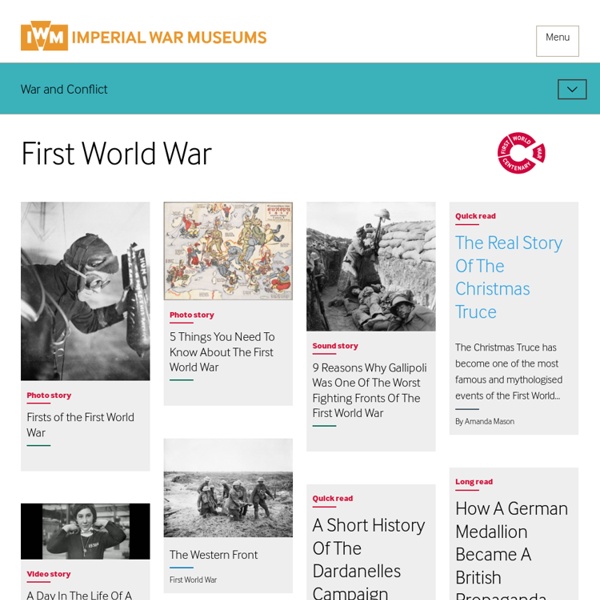



La collection des autochromes. La collection des autochromes. Afficher les infos La collection des autochromes. Description : Cagna de poilus. Date : 1914- 1918 Lieu : France / Algérie / Reims / Verdun / Marne / Meuse / Pas-de-Calais / Haut-Rhin / Noyon / Constantine / Oran / Blida / Medea / Oise / Tunisie / Bizerte / Ile de Djerba / Aisne / Thann Photographe : Tournassoud Jean-Baptiste / Castelnau Pierre-Joseph-Paul / Cuville Fernand / Samama-Chikli Albert / Queste Paul Origine : Collection Tournassoud - ECPAD Référence : AUL-108 Le reportage présente l’ensemble des autochromes de la collection conservée à l’ECPAD. Elle est composée de photographies réalisées en partie par des opérateurs de la section photographique de l’armée et par le chef d’escadron Jean-Baptiste Tournassoud pendant la première guerre mondiale. Lancer la galerie photo
Lives of the First World War - Home page Mot-clé grande guerre Général Gallieni, 1915 Moment de grâce, 1916 Dreyfus, officier de la légion d’honneur, 1919 Grand’Place d’Arras, 1919 L’adjudant Jean-Pierre Lenoble, 1921 Mise au tombeau du Soldat inconnu, 1921 Bombardement rue de la Lune, 1918 Lunchtime, 1916 Morts pour la France, 1917 Auguste Thin et le Soldat inconnu, 1920 Soldats aveugles, 1916 Poilu sept fois blessé, 1916 Marcel, mobilisé de 1914 Départ des volontaires belges, 1914 Henri, mobilisé de 1914 Soirée à la cave, 1918 14, rue de Rivoli, 1918 Comme des bêtes fourbues, 1916 Bombardement rue de Tolbiac, 1918 Le chemin, la vérité et la vie, 1916 Hôtel de ville de Montdidier, 1919 Obsèques de victimes parisiennes, 1918 Station de métro refuge, 1918 Permission en famille, 1915 « précédents - page 1 de 2 Fil des articles “grande guerre”
Operation War Diary Centenaire de 14-18 Europeana Collections 1914-1918 - guerre 14 - 18 Ce site présente un ensemble de photographies de la première guerre mondiale. Les clichés sont réalisés pour la plupart sur les zones de conflits, principalement dans les départements de la Marne et de la Somme. Ces photos proviennent d'une collection personnelle. Voir explicatif - voir une photo en relief Les renseignements sur les dates des évènements photographiés sont malheureusement inexistants. Les photographies nous transportent dans un passé déja lointain. Certaines vues sont très dures ; elles nous font découvrir la triste réalité de la guerre. A la mémoire des combattants présentation stéréoscopie (vision en relief) SVP - N'utilisez pas ces photos pour des publications personnelles ou commerciales
Untold Stories of the First World War Photos, letters and other memorabilia It was the war that tore Europe apart – a struggle between the central powers of Germany, Austria-Hungary, Turkey and Bulgaria, against the allied powers of Britain, France, Belgium, Russia, Italy and the USA. No European nation was left untouched – even neutral states felt the impact of the war. Renowned historian and WW1 author Peter Englund said: “This important and imaginative project tells the other side of the story, from the point of view of a young soldier who signed up seeking adventure, to the family devastated by news that he was one of millions who would never return.
The Great War Archive Happy Valentine's Day My Angel last night I received a letter from you. I learned how strong was the pain on the day we had to separate. Do you remember those beautiful kisses? Do you remember the last one we gave each other between the tears. This moving love letter was sent by Sergeant Major Giuseppe Castellani, to his wife Antonia at home in Fossato di Vico, while he was away serving in the Italian army during the First World War. Images: "Memory of our glorious Alps" sent 19 September 1917, and reverse View the full story and the images here. Words by Alun Edwards and Monica Rossi, University of Oxford
Tells the stories of how the wars of the twentieth century have affected people,
covering all aspects of life in wartime. Includes online exhibitions. by chicken62143 Apr 22